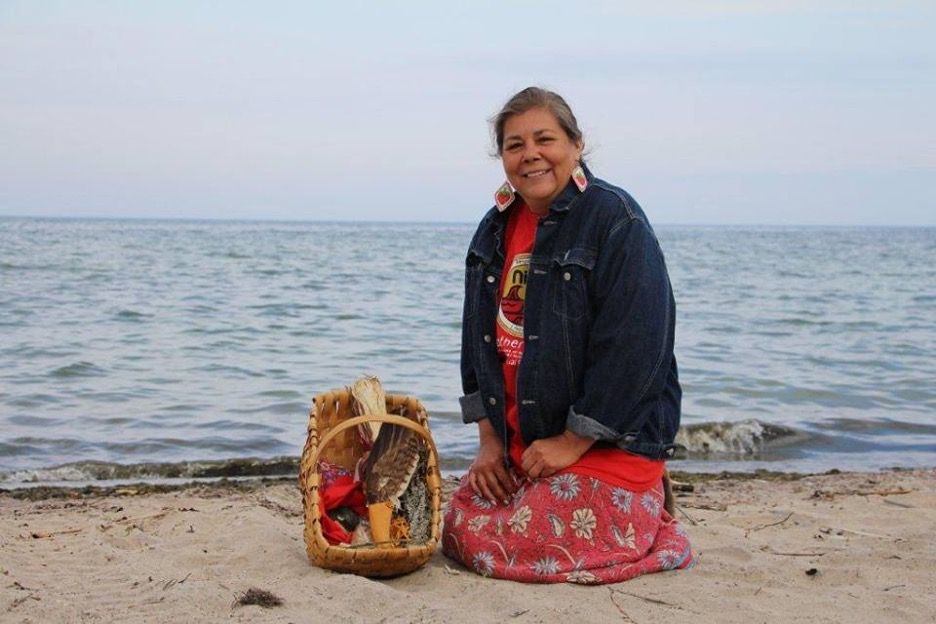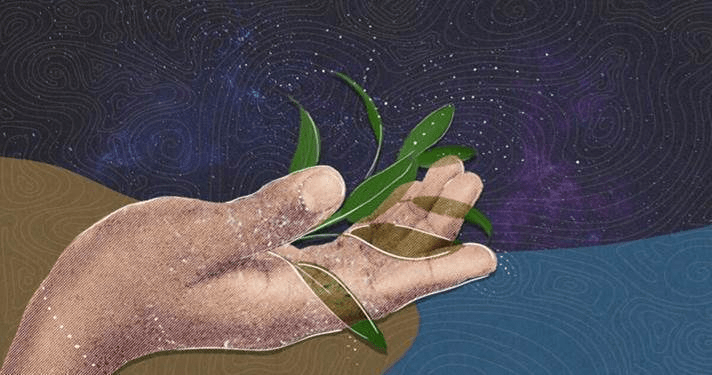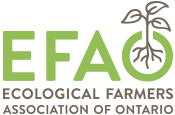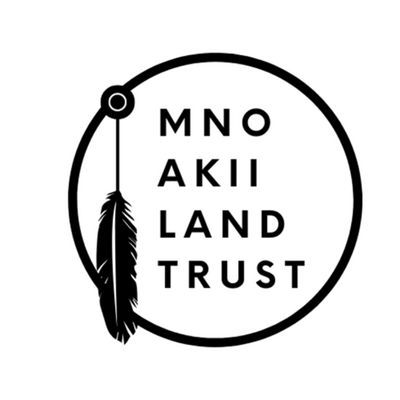Mno Aki Land Trust (Mno Aki) is an Indigenous and women-led land trust model, federally incorporated in 2021 and a registered charity. In 2022, two of its founders, Becky Big Canoe and Sonia Molodecky, participated in a webinar with EFAO and Local Food and Farm Co-ops, to share about the unique model and approach. This article summarizes what they shared in that webinar.
In so-called Canada, the land that the 600+ First Nations have access to through the reserve system is a fraction of one percent, and inadequate to meet community needs, says Becky Big Canoe. Historically, many Indigenous people were farmers and food producers, but the Indian Act gave Indian Agents full control over the marketing and profits from that labour. Becky says that the 1960s demarcated a switch from self-sufficiency to an imposed welfare state on Indigenous reserves. Today, a growing youth population combined with a zeitgeist of support for Grandmother leaders is contributing to a strong landback movement, and imagining new ways of accessing land that are aligned with community values.

Becky Big Canoe is the Managing Director of the Mno Aki Land Trust.
Sonia and Becky wanted to create a solution for long-term access to land that incorporates traditional Indigenous governance models and values, including providing sustainable relationships with land for generations to come. “Mno Aki means ‘Good Earth’ in Ojibwe. It was a combination of a number of grandmothers and women coming together and talking about the land trust model,” Sonia explains.“ Many land trust models had not been successful for various reasons related to politics, administration, and management. So we looked at those models and tried to come up with something that was going to be strong and have a good foundation for success. We incorporated federally in order to be able to give lots of people access to it.”
Mno Aki is a charity that can receive donations or partial donations of lands as well as funds to steward the lands properly. It utilizes a land trust model based on tax incentives to facilitate the gifting of lands for conservation. Sonia elaborates: “Land trusts are ultimately a legal structure that make it easy for people to give or sell land to aligned organizations. It creates a legacy for the donor and continuity for the community, and it gives people ownership and access to land. In return, donors receive a charitable tax receipt that creates significant incentives to do this.”
Part of the understanding behind this approach is that Indigenous concepts of conservation differ from those of the dominant culture. Becky explains, “In 2018, the Indigenous Circle of Experts (ICE) report came out and redefined the term ‘conservation.’ For many years, people across Canada have been donating millions of acres of lands back to conservation, and protecting lands from people. It’s a very outdated definition of conservation, but many people were benefiting from these donations and conserving millions of acres of lands to be locked up and protected from human interaction. Elders came
together for the ICE report and said that Indigenous people view conservation very differently. . . In Indigenous worldviews, conservation is achieved when the relationships and uses that have conserved the lands and waters for thousands of years remain intact or are reestablished.”
Sonia goes on to say, “This blows open the whole definition of conservation. Millions of acres of lands that have been historically donated to protection conservationism are actually open to sustainable land use, such as sustainable farming, training, education, microeconomics, and housing under the Indigenous definition. So we created our land trust based on this definition of conservation.
The Mno Aki governance team consists of Becky, Elizabeth Elson, Dawn Ireland, Mary Boyden, Sonia and Rachel Lachance from Black River Co-op, but in the model, people can donate lands from across the country, and stewardship of the lands takes place at the local level. The model is not governed by one institution, but is instead governed by local women coming together for the benefit of all. The model encourages local governments, local priorities, and local management. For example, as Sonia shares, “We’ve created an overarching governance structure in order to align values and vision, to ensure that we’re all working with the land and each other respectfully. But we’re not here to define local priorities or management systems, because we really believe that the land speaks to what it wants to be at a local level. That’s for individual community groups and organizations to decide for themselves, with guidance, structures, and partnerships that we’re creating to aid them in stewarding the land.”
Becky elaborates on the governance model: “Mno Aki land trust has developed a governance model that is very unique. Donated lands will be made available to local groups via the auspices of a Grandmother Council. Grandmother Councils are encouraged because we believe that grandmothers represent the greatest repository of life experience, cultural knowledge, and skills. Grandmothers recognize the importance of continuity and the importance of reconnecting people to the land. In order to promote cross-cultural relationships, and the growth of bridges across the diversity of individuals, the Grandmother Councils can include non-indigenous members if the local councils so decide. It will be recommended that the decision making be reserved to the Indigenous grandmothers, however, so that it will always be Indigenous principles that are adhered to. If land is donated in a particular area, notice will go out to invite the Indigenous grandmothers there to meet and be introduced to the Mno Aki land trust model. Grandmothers can then decide which way they will organize themselves and how they will assume stewardship of the land. We trust that the Indigenous nations across Turtle Island know their own local land best, and they will be encouraged to revive traditional ecological knowledge practices as much as possible.”

When asked about the kinds of stewardship activities that would be allowed on donated lands, Becky returns to the principle of local management: “Whatever you might want to do, you look at the natural systems that exist on the land. What kinds of plants and animals utilize that area? Every land environment is different. We want to reinforce local control. For example I wouldn’t know what a Tahltan would do with land, or what a Mi’kmaq would do with land. The land and environment will be the determinant.”
Mno Aki would provide resources such as GIS mapping and support relationship building with local knowledge holders in order to determine the kinds of activities that take place, but the local governance structures that are created to support the stewardship of the land will be unique in every context, and can be adjusted to allow for a variety of infrastructure. “We created the purpose [of Mno Aki land trusts] to be for sustainable use, education and awareness, and cultural and spiritual practices,” Sonia explains. This includes ecological farming, training, land-based education, farmers’ markets, and traditional food harvesting and healing practices. Becky and Sonia point to examples such as the Toronto Region Conservation Authority’s Kortright Centre for Conservation as examples of conservation lands that promote education and stewardship, complete with publicly accessible infrastructure. As Sonia says, “It’s community ownership. Rather than one person holding onto 500 acres of lands, what a land trust does is keep lands in the commons.
“The land trust model is a legal vehicle to accomplish your goals, but it’s the co-op model that determines whether it is economically viable,” Sonia shares, when asked about the long-term economic stability of the land trust model. “[Within a co-op,] you can have lots of things — a marketplace, training & education programs, and the plethora of things that make for a multidimensional community experience. This
is what we all used to live in, where everyone was benefitting from and contributing to making the whole work. We’re looking more at an ecosystem community rather than an economic system that includes humans.”
A cooperative structure isn’t necessarily required, but many of the goals of Mno Aki and Indigenous conservation can be addressed by cooperative management. Becky explains that this approach also accounts for the important consideration of succession planning. “The idea . . . is to have the children involved so living on that land is just your way of life. I think we kind of view things as not ‘this is my land,’ but ‘I am of this land.’ Like, the land owns me, in a sense.” This profound paradigm shift is what Mno Aki seeks to create and support.
To learn more about the Mno Aki land trust and explore how you might support and encourage their work, visit www.mnoaki.org.
Becky Big Canoe is an accomplished AnishinaabeKwe mother, sustainable housing proponent, writer, artist, activist and powwow dancer. She lives on Georgina Island.
Sonia Molodecky is a Canadian-Ukrainian lawyer with more than 15 years’ experience working in international business, law, human rights and community building with indigenous nations across the Americas, Africa and Asia. She lives in King Township where she grows her own food, forages and works with the land.
This article originally appeared in the Spring 2023 issue of the EFAO Magazine, Ecological Farming in Ontario. To receive a print copy of the magazine, become an EFAO member.

